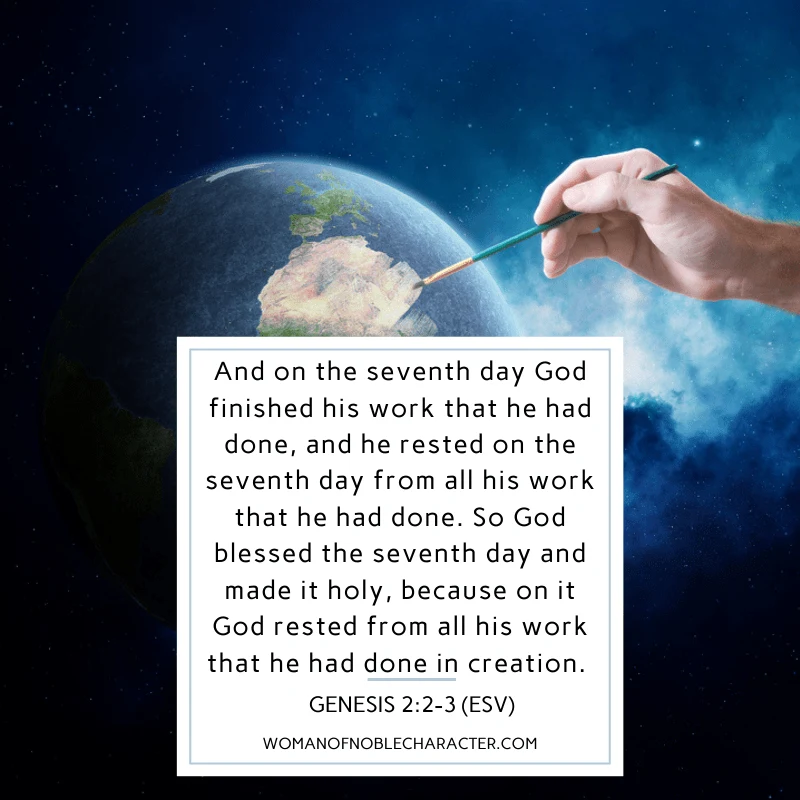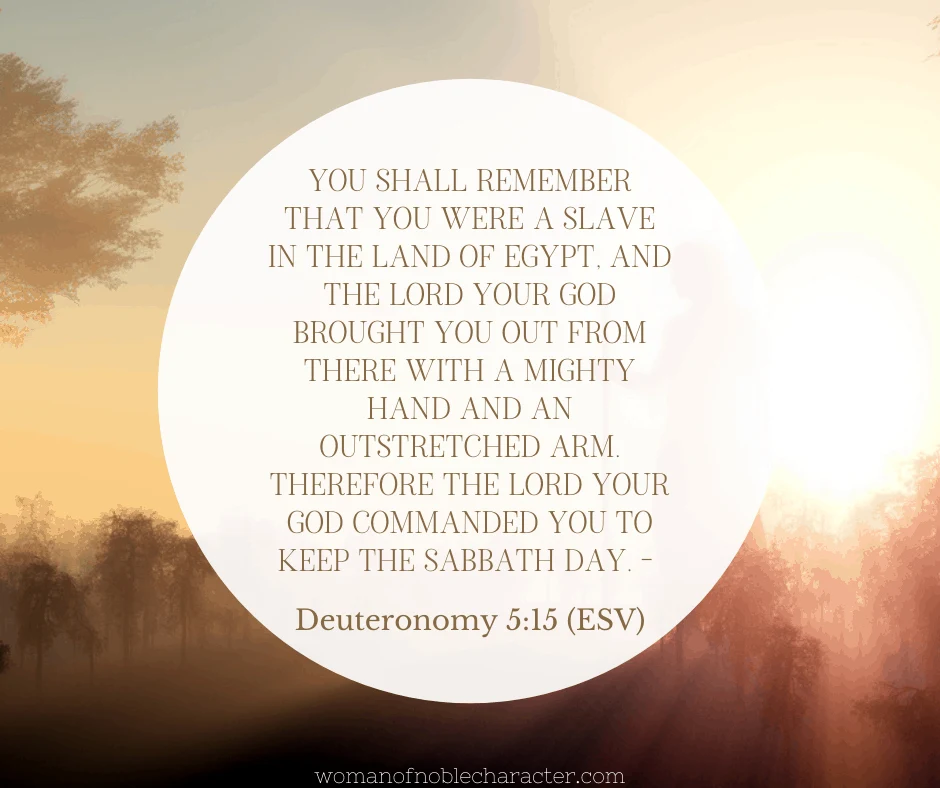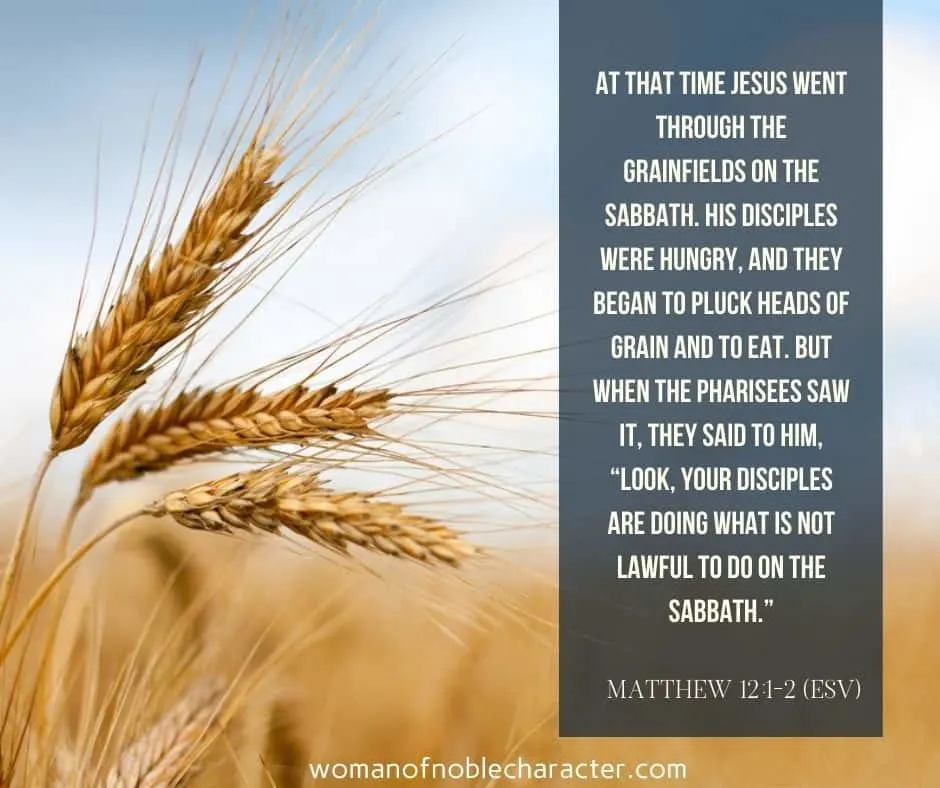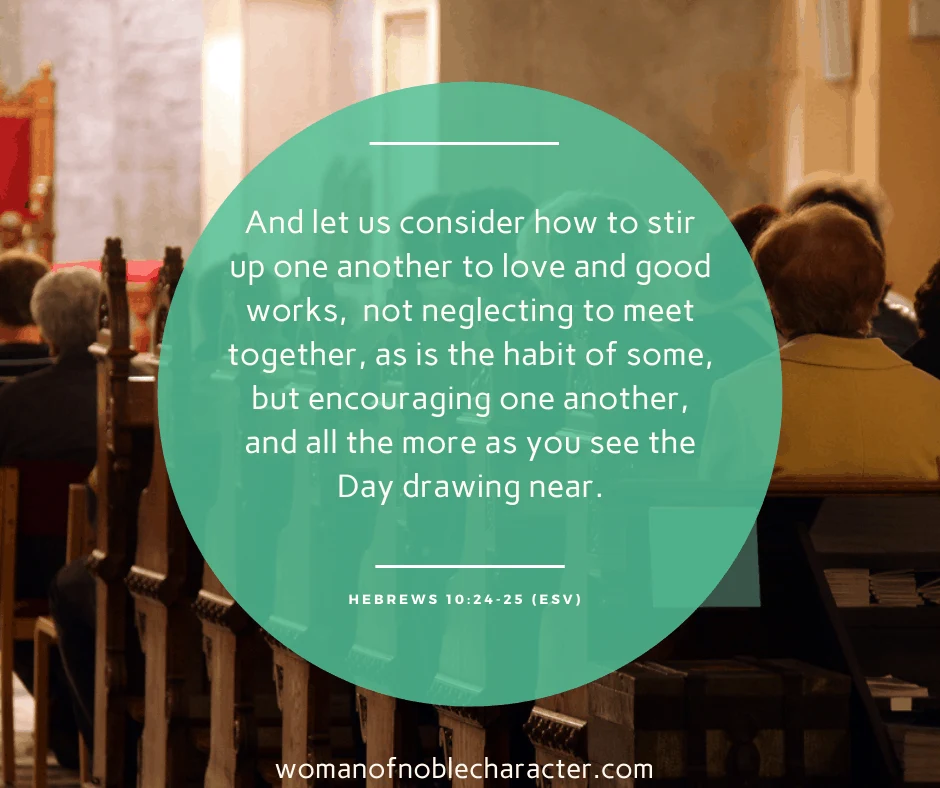This page/post may contain affiliate links. As an Amazon Associate, as well as an affiliate of other programs, this means if you purchase something using these links, I will receive a commission on qualifying purchases at no cost to you! For more detailed information, please visit our Affiliate Disclaimer page
Even before God created man, before He established His covenant with Israel, he set aside a day of rest: the Sabbath.
So, what does observing the Sabbath mean for us today? Are Christians supposed to observe the Sabbath? And if so, how? Why would we follow the commandment to “remember the Sabbath” if we don’t have to live by some of the other laws in the Old Testament (such as animal sacrifice, eating only certain animals, etc.)?
Let’s dive into the Sabbath, its origins, scripture and what it means for Christians to observe the Sabbath today.

The Provenance of the Sabbath
Before we look at observing the Sabbath and what the Sabbath is and when God established it, let’s look at the word Sabbath in Hebrew Scripture. (These are great verses to do some verse mapping with!)
There are two Hebrew words for “rest” in the Bible.
The first word is “shabbat”, which is partially translated into the English word “sabbath”. This word for rest commonly means to “stop working.” Consider it like a job where you would clock in or out. When your work is done, you stop working and clock out.
The second Hebrew word for rest used in the Hebrew Scriptures is “nuakh”. This word means to “dwell” or “settle.”
You can see that it is much different from shabbat or stop working.
This type of rest is like enjoying family time gathered around the family room in fellowship. It essentially means to be restfully present.
God created both shabbat and nuakh close to the same time. In the scriptures about creation, we read that God created for six days and He rested on the seventh.
And on the seventh day God finished his work that he had done, and he rested on the seventh day from all his work that he had done. So God blessed the seventh day and made it holy, because on it God rested from all his work that he had done in creation. – Genesis 2:2-3 (ESV)

After creating the earth, water, sky, and land, He rested from His work.
A few verses later, we read that God created man, then woman, then “rests them” or “settles them” with Himself in the garden of Eden (nuakh).
The Lord God took the man and put him in the garden of Eden to work it and keep it. – Genesis 2:15 (ESV)
Other translations read:
“The Lord God took the man and ‘rested him’ [nuakh] into the garden of Eden to work it and keep it.” – Genesis 2:15
So, it seems that the ideas of shabbat and nuakh are intended to work together.
God, Himself, shows us that He rests from work (shabbat) and then dwells or settles in with humans (nuakh).
We also read of God’s continued presence with the Hebrews:
so that the priests could not stand to minister because of the cloud, for the glory of the Lord filled the house of God. – 2 Chronicles 5:14 (ESV)
The instances of the Lord’s divine presence remind us of the garden of Eden where God and his people first dwelled together.
That was the intention of the first, the original, Sabbath. God intended the Sabbath to be a day that He and His people could rest together in their relationship.
Later, in Exodus 20 we read:
“Remember the Sabbath day, to keep it holy. Six days you shall labor, and do all your work, but the seventh day is a Sabbath to the Lord your God. On it you shall not do any work, you, or your son, or your daughter, your male servant, or your female servant, or your livestock, or the sojourner who is within your gates. For in six days the Lord made heaven and earth, the sea, and all that is in them, and rested on the seventh day. Therefore the Lord blessed the Sabbath day and made it holy. – Exodus 20:8-11 (ESV)
And in Deuteronomy:
You shall remember that you were a slave in the land of Egypt, and the Lord your God brought you out from there with a mighty hand and an outstretched arm. Therefore the Lord your God commanded you to keep the Sabbath day. – Deuteronomy 5:15 (ESV)

Throughout the remainder of the Old Testament, observing the Sabbath remained an important facet of Israel’s faithfulness to God—or the lack of their faithfulness. In the New Testament, when Jesus walked the earth, the Hebrews were following a multitude of sometimes confusing and complex list of Sabbath regulations.
This rhythm of work and rest doesn’t last too long, however. As we read further in scripture, the Israelites fail in observing the Sabbath (shabbat) quite often.
Moreover, I gave them my Sabbaths, as a sign between me and them, that they might know that I am the Lord who sanctifies them. But the house of Israel rebelled against me in the wilderness. They did not walk in my statutes but rejected my rules, by which, if a person does them, he shall live; and my Sabbaths they greatly profaned. – Ezekiel 20:12-13 (ESV)
But if you do not listen to me, to keep the Sabbath day holy, and not to bear a burden and enter by the gates of Jerusalem on the Sabbath day, then I will kindle a fire in its gates, and it shall devour the palaces of Jerusalem and shall not be quenched.’” – Jeremiah 17:27 (ESV)
The Israelites were ignoring the sabbath, worshiping false gods and rebelling in multiple ways.
However, our God is so good, that He rests, or nuakhs, and is present with them, anyway at the tabernacle and later at the temple.
Then the cloud covered the tent of meeting, and the glory of the Lord filled the tabernacle. – Exodus 40:34 (ESV)
Observing the Sabbath in the New Testament
Jesus, during His ministry on earth, declares Himself the absolute giver of rest.
“Do not think that I have come to abolish the Law or the Prophets; I have not come to abolish them but to fulfill them. – Matthew 5:17 (ESV)
He is fulfilling prophecy.
He tells us:
“Come to me, all who labor and are heavy laden, and I will give you rest. Take my yoke upon you, and learn from me, for I am gentle and lowly in heart, and you will find rest for your souls. For my yoke is easy, and my burden is light.” – Matthew 11:28-30 (ESV)
For the Son of Man is lord of the Sabbath. – Matthew 12:8 (ESV)
Jesus pronounced that He is the Lord of the Sabbath and that the Old Laws were removed, and He has come to fulfil scripture.
This doesn’t mean that we no longer must observe the Sabbath, but, yet, we observe it differently than the Israelites in the Old Testament.
The Sabbath in the New Testament
To understand how we, as Christians, should be observing the Sabbath, we need to look at three Bible passages in the New Testament that allow us to comprehend this.
1. Colossians 2:16-17 and Hebrews 10:1
In Paul’s letter to the Colossians, he writes:
Therefore let no one pass judgment on you in questions of food and drink, or with regard to a festival or a new moon or a Sabbath. These are a shadow of the things to come, but the substance belongs to Christ. – Colossians 2:16-17 (ESV)
This portion of Paul’s letter is incredible and so very interesting. In it, we are told that the Sabbath was a shadow of the past – just a glimpse of the future, but that Jesus is the substance – the future for prophecy fulfillment.
The word that Paul uses for shadow is the Hebrew word “skia, which means “shade” or a shadow (literally or figuratively (darkness of error or an adumbration). Note that it tells of darkness of error – basically that the Old Testament laws were a “darkness of error”.
We see this again in Paul’s letter to the Hebrews:
For since the law has but a shadow(skia) of the good things to come instead of the true form of these realities… – Hebrews 10:1 (ESV)
Both the Sabbath and sacrifices of the Old Testament were ultimately skia (shadows) designed to anticipate the coming of the Messiah—the anointed one of God who would come to save the world.
2. Romans 14
In Romans 14:5, Paul says:
One person esteems one day as better than another, while another esteems all days alike. Each one should be fully convinced in his own mind. – Romans 14:5 (ESV)
So, Paul is saying that some will argue about the Sabbath. He is, once again, referring to the fact that the Old Laws are inconsequential. We are under a new covenant with the birth, life, death and resurrection of Jesus, the Messiah.
3. Hebrews 4:9-11
In this letter from Paul to the Hebrews, we see further evidence that Jesus has given us eternal rest through our faith in Him.
So then, there remains a Sabbath rest for the people of God, for whoever has entered God’s rest has also rested from his works as God did from his. – Hebrews 4:9-11
Let us therefore strive to enter that rest, so that no one may fall by the same sort of disobedience.
The weekly Sabbath had always pointed to more than just one day of rest. It has pointed to eternal Sabbath in heaven.
Did Jesus Observe the Sabbath?
In the New Testament, we see a vivid picture of the Lord’s presence on earth and how He dwelled with His people through His Son Jesus.
The Gospel tells us that Jesus had a lot to say about the Sabbath and the true rest that God intends for his people.
We have several passages to look at Jesus on the Sabbath and what He had to say when confronted by the religious leaders and teachers.
At that time Jesus went through the grainfields on the Sabbath. His disciples were hungry, and they began to pluck heads of grain and to eat. But when the Pharisees saw it, they said to him, “Look, your disciples are doing what is not lawful to do on the Sabbath.” – Matthew 12:1-2 (ESV)

He went on from there and entered their synagogue. And a man was there with a withered hand. And they asked him, “Is it lawful to heal on the Sabbath?”—so that they might accuse him. He said to them, “Which one of you who has a sheep, if it falls into a pit on the Sabbath, will not take hold of it and lift it out? Of how much more value is a man than a sheep! So it is lawful to do good on the Sabbath.” Then he said to the man, “Stretch out your hand.” And the man stretched it out, and it was restored, healthy like the other. But the Pharisees went out and conspired against him, how to destroy him. – Matthew 12:9-14 (ESV)
He said to them, “Have you not read what David did when he was hungry, and those who were with him: how he entered the house of God and ate the bread of the Presence, which it was not lawful for him to eat nor for those who were with him, but only for the priests? Or have you not read in the Law how on the Sabbath the priests in the temple profane the Sabbath and are guiltless? I tell you, something greater than the temple is here. And if you had known what this means, ‘I desire mercy, and not sacrifice,’ you would not have condemned the guiltless. For the Son of Man is lord of the Sabbath.” – Matthew 12:3-8 (ESV)
We can see that Jesus responds to their arguments by asserting that He is the promised Messiah and points to His own divinity.
Clearly, the Pharisees are not happy with Jesus’ response about observing the Sabbath. However, Jesus’ observance pointed to something greater.
So, we look at the scriptures that mention both rest and Sabbath. Remind you of our earlier discussion about shabbat and nuakh?
It seems that God’s people had become weary and burdened by the heavy weight of observing the Sabbath, and Jesus hoped to redefine the meaning of Sabbath for them. The people needed rest, both in ceasing from hard work (shabbat) and being present together with God (nuakh). Jesus ushered in the promise and reality of both.
In Jesus’ responses about observing the Sabbath, He reminded the people of the Lord’s intent for the Sabbath, which was unity with Him.
Jesus taught that the Sabbath was about mercy and was purposeful. It was supposed to point to him, – resting in Him.
When followers of Jesus observe the Sabbath, we live as if this restoration has already taken place. We take a break from the chaotic hustle and bustle of life, difficulties and hardships and set aside a time of submission to his rule and fellowship in His When we observe the Sabbath well, we become little resting places of God’s presence.
How Should Christians Observe the Sabbath – and When?
So how do we, as Christians, observe the Sabbath. Ultimately, we do this by resting in the finished work of Christ Jesus.
Many Christians believe that they are observing the Sabbath each Sunday when they go to church service and come home to relax. Of course, attending worship services are important for all Christians, the church=Sabbath calculation is not quite right.
Biblical scholars recognize that the seventh day of the week was and is Saturday. More precisely, using the biblical method of marking time, it is from Friday at sunset to Saturday at sunset.
So, who changed the Sabbath from Saturday to Sunday? God didn’t, and neither did the apostles or early New Testament Church. Nowhere in the Bible was the Sabbath day changed to Sunday.
Technically, Sunday is not the Sabbath day, but, rather, the Lord’s Day. Christians gather for worship on the first day of the week because it is the day that Jesus Christ was resurrected from the dead.
Even though we are no longer under the Sabbath law like Old Testament believers, it is still important for Christians to honor the Sabbath that God commanded since creation and, even modeled Himself.
Rest is vitally important for all, but especially believers. A pattern of work and rest should be woven into our lives.
The command to “remember the Sabbath day by keeping it holy” carries rich significance across the unfolding storyline of Scripture. While it is certainly wise to seek periods of intentional rest in God, the command itself no longer binds believers because the new covenant has arrived in Jesus. The ultimate way we “observe the Sabbath” today, then, is by embracing its fulfillment—the One who offers eternal rest to anyone who trusts in him.
It’s not wrong to observe the Sabbath on Sunday, as Christians, if we are actively seeking to be resting in Him on that day.
Observing the Sabbath: What Does it Look Like Today
So, what does this look like practically? Does it mean attending a weekend church service, or turning off work emails, or volunteering at a soup kitchen? Does it matter what day you observe Sabbath? Your Sabbath could certainly include those activities, and it could take place on the same day every week! But the text seems to emphasize the purpose of the Sabbath, rather than telling us rules for how to observe it.
As followers of Jesus, we aren’t required to follow the laws given to Israel by God, anymore. These were given at a specific time to a specific people group for a specific purpose. Yet the wisdom of those laws is enduring, and the law of the Sabbath remains holy. It is not a commandment we are bound to; it’s a promise we’re invited to.
Sabbath rest is an invitation to practice for eternity. It’s where we regularly, intentionally engage in God’s rule and reign in our hearts and on earth. We must shabbat in order to nuakh—to stop working and truly rest in God’s presence. When we practice this intentional stop, we make room for him to take up residence in our individual lives. When we do this together, we’re making space for it in our communities. Even better, we are taking part in this new creation story, setting the stage for God to make his dwelling place, his resting place, right here.
We are still required to work diligently for six days to meet our needs and prepare well for the Sabbath each week. This teaches us diligence, planning and priorities. God mandates a day of rest not to promote idleness, but because we need it.
But more than sleep and doing nothing, the Sabbath is a day for doing something different: refocusing on God, worshipping, and fellowshipping with Christians of like mind, praying, studying the Bible, and meditating on His Word.
And let us consider how to stir up one another to love and good works, not neglecting to meet together, as is the habit of some, but encouraging one another, and all the more as you see the Day drawing near. – Hebrews 10:24-25 (ESV)

Observing the Sabbath is a day to spend time with family and other Christians, serve others and seek Him. The Sabbath should be a joy for us, but not a day of seeking our own pleasures (hobbies and interests). It is meant to be a day to honor God and seeking to please Him and do His will.
“If you turn back your foot from the Sabbath,
from doing your pleasure on my holy day,
and call the Sabbath a delight
and the holy day of the Lord honorable;
if you honor it, not going your own ways,
or seeking your own pleasure, or talking idly;
then you shall take delight in the Lord,
and I will make you ride on the heights of the earth;
I will feed you with the heritage of Jacob your father,
for the mouth of the Lord has spoken.” –
Isaiah 58:13-14 (ESV)
You may enjoy this video with tips for observing the Sabbath:
Or one of these recommended resources:


Breathe Bible Study: Making Room for Sabbath by Priscilla Shirer
How do you observe the Sabbath? What tips do you have for others to put aside selfish pleasures and delight in fellowship with the Lord by observing the Sabbath?
